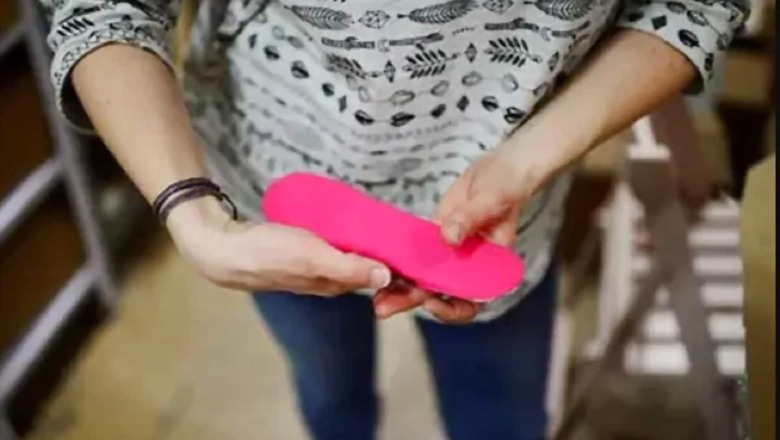
views
More than 65 per cent of India’s population lives in rural areas. And women constitute 48 per cent of India’s total rural population. Menstruation is a common, natural bodily process. But for most women in rural India, easy access to menstrual health and hygiene is a far cry. This fundamental lack impacts their lives in many ways—it restricts their mobility, limits their day-to-day choices, affects school participation and employment, and remains a source of stress and anxiety.
Many parts of rural (as well as urban) India are still steeped in harmful myths and misconceptions around menstruation. In certain regions and communities, a menstruating woman is completely ostracised. Discriminatory practices that target menstruating women—prohibitions against entering the kitchen, going to the temple, touching pickles, washing one’s hair, and not being allowed to play—continue in many homes.
A few weeks ago, the Press Information Bureau’s Fact Check Twitter handle debunked a WhatsApp forward urging women not to get vaccinated for five days before and after their period, ostensibly due to “lower immunity”. As social entrepreneur Ira Guha points out, the average period lasts five days, which means that “women were being advised that for 15 days out of every month, it was unsafe for them to take the vaccine.”
Restricting a girl’s mobility during her periods, or making sure that she “touches nothing”, effectively shuts off her access to any form of normalcy for up to 10 days every month, adversely impacting her ability to participate in society and the economy.
In addition to myths and misconceptions, women and girls are sometimes asked to eat a bland, nutrition-reduced diet. Special needs, such as the increased requirement for an iron-rich diet, are either not known or not followed, leading to avoidable problems such as anaemia, which affects nearly 53 per cent of girls and women (between the ages of 15-49) in India.
If we add to this to the fact that rural women are already among the lowest-paid workers in the country, the picture that emerges is troubling. More than 81 per cent of India’s female workforce lives in rural areas, but women account for only 19.9 per cent of the total labour force, as per World Bank Data (2020).
It is clear, therefore, that regressive practices long enforced by societal norms are among the many challenges rural woman face, right from their adolescence, and these typically begin with truncated school access. School dropout rates among girls, especially in rural areas, peak at puberty. Even with those who don’t drop out, the problem of chronic absenteeism remains, affecting educational outcomes.
And yet, not only is school the ideal place where children can be socialised into accepting periods as natural, it is also a convenient distribution point for sanitary napkins. Further, it is a great place to demonstrate how something as basic as the availability of clean, private, girls’ toilet with running water has the power to catalyse massive social change. With schools closed during the pandemic, one can imagine its impact on menstrual health of girls in rural India.
It is, therefore, imperative that issues of menstrual hygiene get the attention they deserve, and especially in the context of the Sustainable Development Goals (SDGs), particularly SDGs 4 and 5—quality education and gender equality. It is critical to drive home the message that this bodily function is treated not as a disability but as part of healthy adolescent and adult life, as something to be managed using sanitary and other products.
As it turns out, the pandemic has also affected the supply chain of menstrual products. In a recent (2021) survey conducted by Menstrual Health Alliance India (MHAI), 84 per cent of women respondents said that menstrual products, especially sanitary pads, were either unavailable or difficult to access. This deficit in supply may add to the pressure to return to traditional methods of managing periods, such as using cloth rags, leaves and ash, which impose a great cost on reproductive health.
Even a seemingly eco-friendly option such as rags can become a health hazard due to the taboos that prevent women and girls from washing and drying the rags properly in the sun before use. Such taboos may also cause a slippage back into traditional myths and misconceptions. In combination with the widespread belief that sanitary napkins are a luxury, they would tend to further depress the uptake of pads and other products. A regular and affordable supply of sanitary products can help break this vicious cycle.
A lesser-known, indirect impact of the pandemic— related to its adverse effects on mental health—is on the menstrual cycle itself. In a UK-based study, 53 per cent of the women surveyed reported a worsening of pre-menstrual symptoms during the pandemic. Although a comparable Indian survey is yet to be carried out, it can be safely assumed that the devastating effect of the pandemic has also disturbed the menstrual cycles of otherwise healthy women—something that organisations and entities working in the area need to take note of.
To combat all these related issues, many of which have developed over the past year, communities and the government must pool their resources towards increasing the demand for—and supply of—low-to-no cost menstrual products. The government’s scheme of providing sanitary products free of cost in schools, when seen in this light, is a step in the right direction. In a welcome move, the Assam government recently added sanitary napkins to the list of relief materials to be distributed among women and adolescent girls affected by floods and other natural disasters, recognizing the importance of menstrual management during emergencies.
What is needed now is a consolidated effort to bust the myths around menstruation, boost the belief in safe menstrual practices, and make education on menstrual health and hygiene available within and outside all schools, especially in rural India.
Read all the Latest News, Breaking News and Coronavirus News here.


















Comments
0 comment